The Mystery Of Life
Have you ever, for yourself, tried to define "life"? Before asking questions like "what's the purpose of life" or "how did life originate", don't you think it would be a good idea to first know what we're talking about?
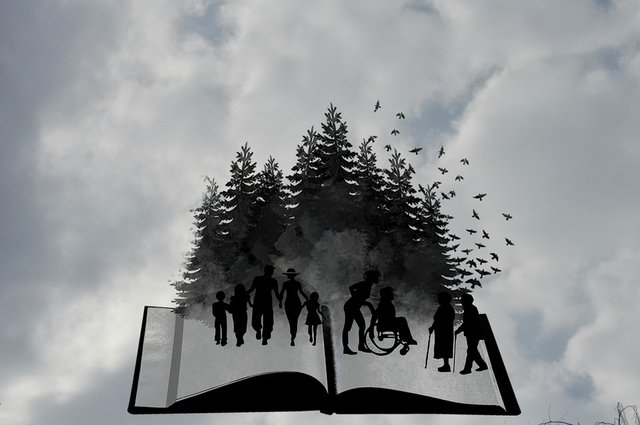
the book of life
image by Alexas_Fotos - source: Pixabay
As with so many things, we've reached a point in our scientific progress that we can describe life pretty good; we recognize what makes something alive versus something that isn't alive. A rock just is. A plant is alive. In fact, all living things, all life we know of, is made up of cells, and the cell is the smallest "unit of life" in existence. If you tried and failed to exactly define life for yourself, don't feel too bad, since science can recognize life, but finding a good and all-encompassing definition of life is hard. Especially the question where to exactly draw the line between alive and dead seems a difficult one to answer.
Although the scientists, technicians, and others who participate in studies of life easily distinguish living matter from inert or dead matter, none can give a completely inclusive, concise definition of life itself. Part of the problem is that the core properties of life -growth, change, reproduction, active resistance to external perturbation, and evolution- involve transformation or the capacity for transformation. Living processes are thus antithetical to a desire for tidy classification or final definition. To take one example, the number of chemical elements involved with life has increased with time; an exhaustive list of the material constituents of life would therefore be premature.
source: ENCYCLOPÆDIA BRITANNICA
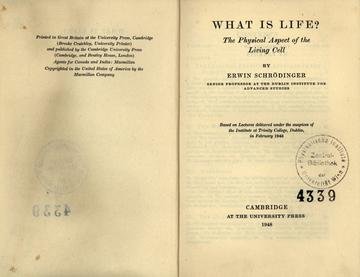
In the book, Schrödinger introduced the idea of an "aperiodic crystal" that contained genetic information in its configuration of covalent chemical bonds. In the 1950s, this idea stimulated enthusiasm for discovering the genetic molecule. Although the existence of some form of hereditary information had been hypothesized since 1869, its role in reproduction and its helical shape were still unknown at the time of Schrödinger's lecture. In retrospect, Schrödinger's aperiodic crystal can be viewed as a well-reasoned theoretical prediction of what biologists should have been looking for during their search for genetic material. Both James D. Watson, and Francis Crick, who jointly proposed the double helix structure of DNA based on X-ray diffraction experiments by Rosalind Franklin, credited Schrödinger's book with presenting an early theoretical description of how the storage of genetic information would work, and each independently acknowledged the book as a source of inspiration for their initial researches.
source: Wikipedia
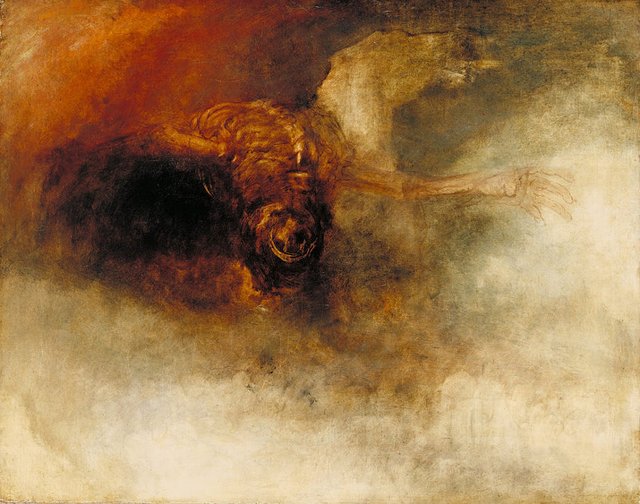
Joseph Mallord William Turner - Death on a pale horse
source: Wikimedia Commons
According to physics' second law of thermodynamics, the total entropy of a closed system can never decrease over time. Entropy can, for this posts sake, be regarded as chaos or disorder. This second law of thermodynamics says that everything in a closed or finite system tends to evolve into a state of ever increasing disorder. This is the law that explains the irreversibly of natural processes through time; everything decays into chaos eventually, so will the universe itself someday in the extreme far future.
Living things seem to contradict this law, since they are highly organized and maintain some inner equilibrium instead of giving in to the natural decay. For this process energy is needed, which living things obtain through some sort of metabolism; they interact with their surroundings to transform light or matter into the energy needed to maintain the inner equilibrium, to keep the orderly organization intact and keep the "machine" going. Living things invest energy to create order.
What Is A Cell?
I call it a machine, because the above describes the smallest unit of life known on earth, the cell. The mystery is this: all parts of the cell are dead, so what makes the whole come alive? It has a wall, separating it from the outside world and maintaining order. It regulates itself and maintains a stable state, it consumes to stay alive, it grows and develops, it reacts to external stimuli from the environment, it reproduces and it is subject to evolution: there's that fairly good description of all life on earth I promised in the beginning.
Within each cell there chemical substances, molecules with different atoms and compositions ranging from fairly simple to highly complex, mostly proteins, reacting with each other in a constant flow of thousands of chemical reactions per second. So all of it's parts are dead, just matter that behaves according to the laws of nature. It's a biological machine with in each nucleus that code for the living thing around the cell or the cell itself, which we call DNA. Are these intricate cellular machines built to carry the code into the next generation before the living thing starts to lose it's fight against that second law of thermodynamics and eventually dies?
Is life like consciousness then, an emergent phenomenon that arises from the sum of the complex chemical reactions, like consciousness arises from the sum of the complex electro-chemical reactions in our nervous system? That to me has always sounded like not right. To explain something as "arising from complexity" is a bit like saying you don't know. That it's literally too complex to comprehend.
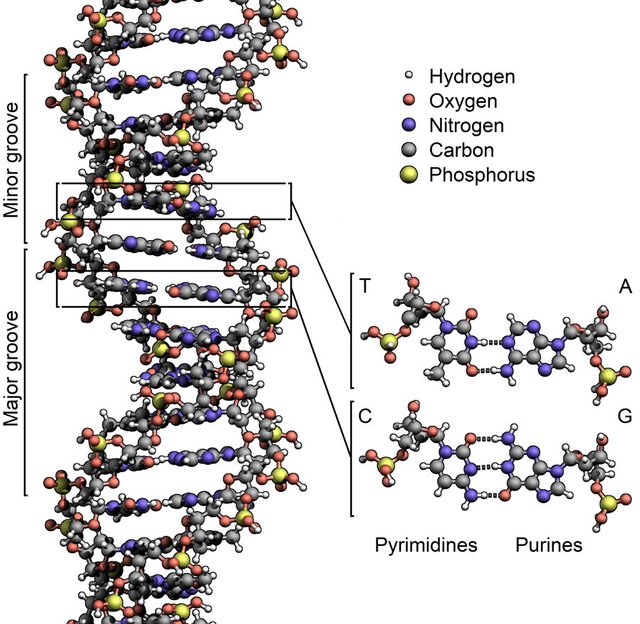
DNA - source: Wikipedia
It seems that the goal of life is to ultimately prevent death. The death of the individual as well as the death of the species, and it achieves this goal by reproduction, by having kids that inherit your life's code, maybe slightly adjusted by combining male and female ancestral information and chance, thereby invoking the process of natural selection that will decide which slight transformations will survive best. It seems so inefficient, such a waste of time and energy to evolve such complex beings as humans, if the goal is just getting DNA into the next generation. In fact, the DNA that develops the most successful living thing around it has the best chance to survive into the future, to continue it's fight against entropy.
Is DNA, or the information stored on that molecule, life then? DNA is a highly complex molecule, but useless by itself; it can't do anything. And this is the border between life and non-life. It's a vague border though, like I said at the start. Look at a virus: that's basically a string of DNA or RNA that needs a cell to do anything. They invade cells to do their bidding, and to make the border even more vague, some can invade dead cells and bring them back alive to do their bidding. And I say "bidding", but there's no conscious being at work here, just mindless chemical end electrical processes...
Or... is consciousness life? Is everything consciousness and is life it's invention to study itself? If we hesitate to classify a virus as alive or not, isn't that proof that we just don't know what life is? I guess, in the end it's only really important to recognize life and to realize that we are alive. And that we're still the only living things known in the universe that can write blogs like this, questioning the nature of all things, including life itself ;-)
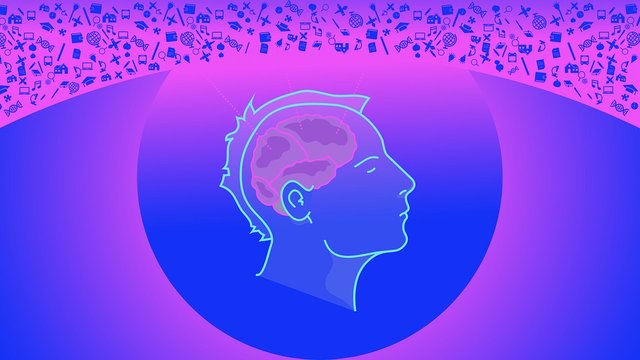
Universe God Cosmos Reality Consciousness
source: Max Pixel
I surely hope this was confusing enough to get you thinking about life and living, and to appreciate the life you have. You've got only this life, this time and the arrow of time always points toward the future, so you can't get any of it back. That's why I hope you don't find the time spent reading this a waste, but that it made you appreciate life's mystery more. Thanks so much for spending some of your time with me, dear reader, and I hope you'll find the time to come back tomorrow :-)

Recent articles you might be interested in:
| Latest article >>>>>>>>>>> | Sluggish Beauty |
|---|---|
| The REAL X-Files | Water's Fourth Phase |
| The Oxygen Catastrophe | What We Believe Matters |
| Microbes Are Forever | The First Casualty Of War |

Thanks for stopping by and reading. If you really liked this content, if you disagree (or if you do agree), please leave a comment. Of course, upvotes, follows, resteems are all greatly appreciated, but nothing brings me and you more growth than sharing our ideas. It's what Steemit is made for!


Just for Full Disclosure, I'm invested in these crypto-currencies:
Bitcoin | Litecoin | EOS | OmiseGo | FunFair | KIN | Pillar | DENT | Polymath | XDCE | 0x | Decred | Ethereum | Carmel | XYO
THIS!
Life is a concept so hard to grasp, the line is so blurry that, like you said, why is a single cell bacteria alive but a virus is not? Viruses do all the things bacterias do except reproduces with it's own means because it lacks the resources so it takes it from others, you could say is a parasitic, but you can see parasitic wasps in the wild a tell that they are very much alive, but they need something else from another animal to reproduce.
That's in the micro sense, what about the macro? Why are not societies alive? Societies are a system very much like ourselves, a circulatory system like highways, factories like the liver.
This is something to think for decades? Is humanity alive? AND WHAT'S UP WITH VIRUSES AGAIN?
Amazing post man! I really enjoy it!
Thanks so much for this valuable addition @elfranz; you've caught a significant oversight on my part in that there's also the larger view you describe here. How on earth did I forget to mention the possibility to also see the planet itself as a living organism, like the Gaia hypothesis..?!? And same could be said of societies to! I love this comment, thanks for that! :-)
Hey @elfranz
Here's a tip for your valuable feedback! @Utopian-io loves and incentivises informative comments.
Contributing on Utopian
Learn how to contribute on our website.
Want to chat? Join us on Discord https://discord.gg/h52nFrV.
Vote for Utopian Witness!
OMG! this is so my kind of subject! I have to come back and read it thoroughly, but from just a quick skim, i know i'll have an enlightening read!
Anyone who mentions Entropy becomes my instant friend :DDD
I'm so glad we share so much of the same interests, @ankapolo, and I'm proud to be able to call you my instant friend too :-)
My thought too. A second read will be necessary tonight :)
There was a perfect amount of complexity to go just above my head but I can reach up and grasp it in a sense :) amazing post :)
Thanks so much @vladivostok :-) I'm glad you liked it enough to grasp it, or grasped it enough to like it..!? ;-) <3
Nice post with a plethora of information and exquisite questions. I have a fairly simple definition of life, it is all contained in that simple but complex twisted ladder shape. If it contains DNA it is or was at some point alive. I don't know of a better way to classify life.
Thank you @coinsandchains :-) It's difficult indeed. And then we're only talking about live as we know it. Who knows if there's other forms of life as well? Silicon based instead of carbon based... ? Who knows?
Silicon-based? That would be really interesting, which does bring another aspect into living things, why always carbon?
This is some really deep stuff. Sometimes, the more we look, the less we see.
Yep, it's deep stuff @solcross and I'm so glad you stopped by to think with me on this enigma we call life ;-)
This is some really
Deep stuff. Sometimes, the more we
Look, the less we see.
- solcross
I'm a bot. I detect haiku.
Hello very interesting subject! "I guess, in the end it's only really important to recognize life and to realize that we are alive. "I totally agree with this.
Thank you so much for taking the time to leave this, @drawmeaship, it's much appreciated :-) I hope to see you again soon!
My pleasure:)
It definitely wasn't a waste of time going through it. Confusing? A little bit.
I actually didn't know that parts of the cell are dead. Hmmm... Its a mystery
Its quite hard to define it (actually, there seem to be no real definition of it) and we can't fully understand it but it sure is worth living and of course getting the best out of it.
Yes, @audreybits, it's a mysterie, but a pleasant one :-) Life's a miracle and our most precious gift ,definitely worth living and enjoying as much as possible!
Yeah, it is! We shouldn't miss out on the opportunity of living it.
Hi zyx066,
Visit curiesteem.com or join the Curie Discord community to learn more.
You wonderful people at @curie... Thanks so much!! I really am honored by the manual curation and want to express how much your work is appreciated. Keep up the good work, and thanks again! :-) <3
Congratulations @zyx066! You have completed the following achievement on Steemit and have been rewarded with new badge(s) :
Click on the badge to view your Board of Honor.
If you no longer want to receive notifications, reply to this comment with the word
STOPTo support your work, I also upvoted your post!
that's the point. a living cell is made up of non living molecules; amino acids, lipids, carbohydrate and nucleic acids- these are molecules that are not living and are being made up of natural elements ( C, H, N, O, P, S ), but they form the structural and metabolic component of a living cell. Another funny part is that these living systems maintain or regulate themselves by influx and eflux of electrolytes (homeostasis).
if life could have been founded on non living elements, then what could have given it the gut to go against the 2nd law of thermodynamics?
science is working hard to close the gap between the living and the the dead trying to create an artificial life from non living primordial molecules, although it seems to be a realistic goal but until then Life remains a mystery.
nice post, you did a good job